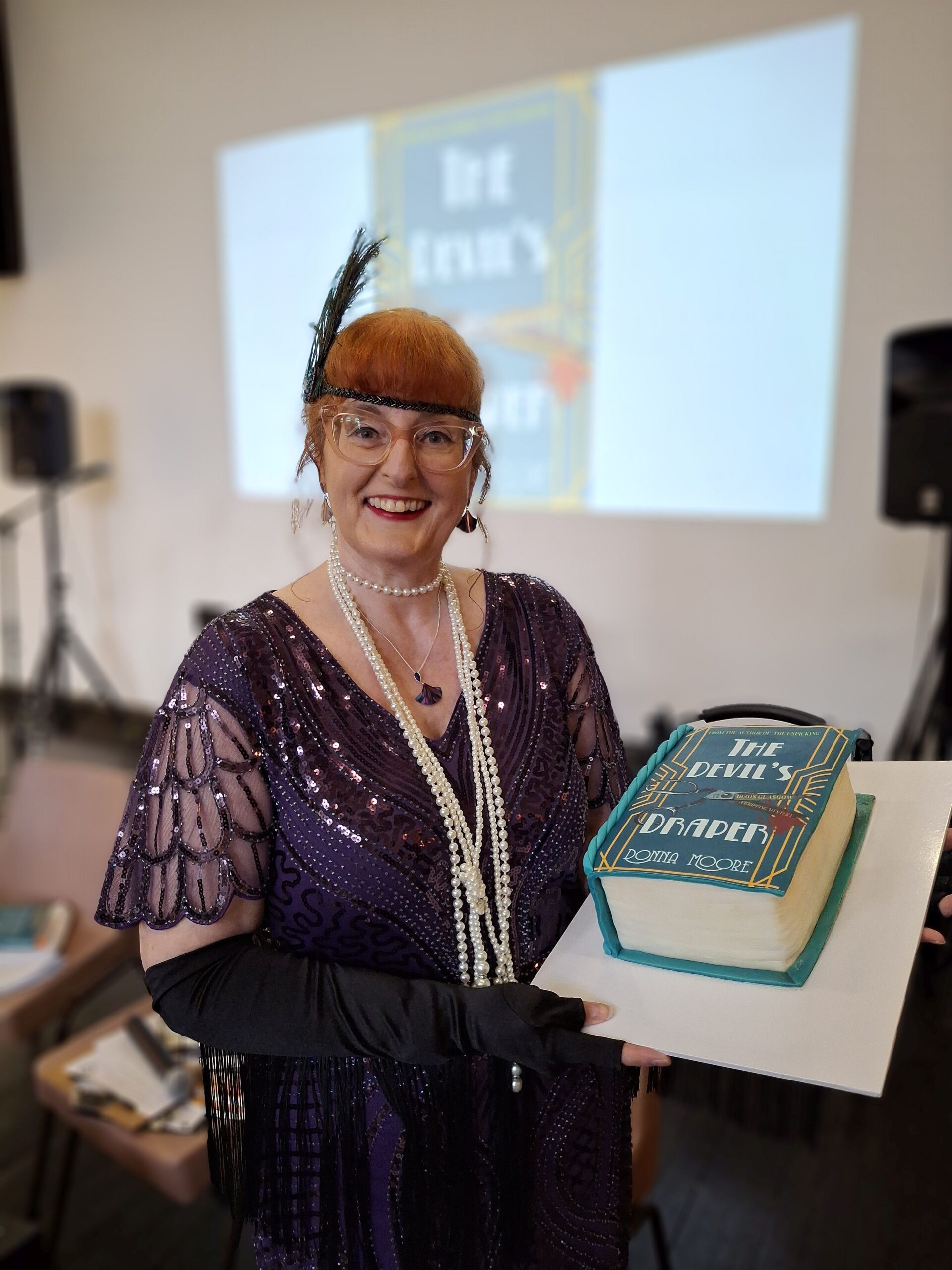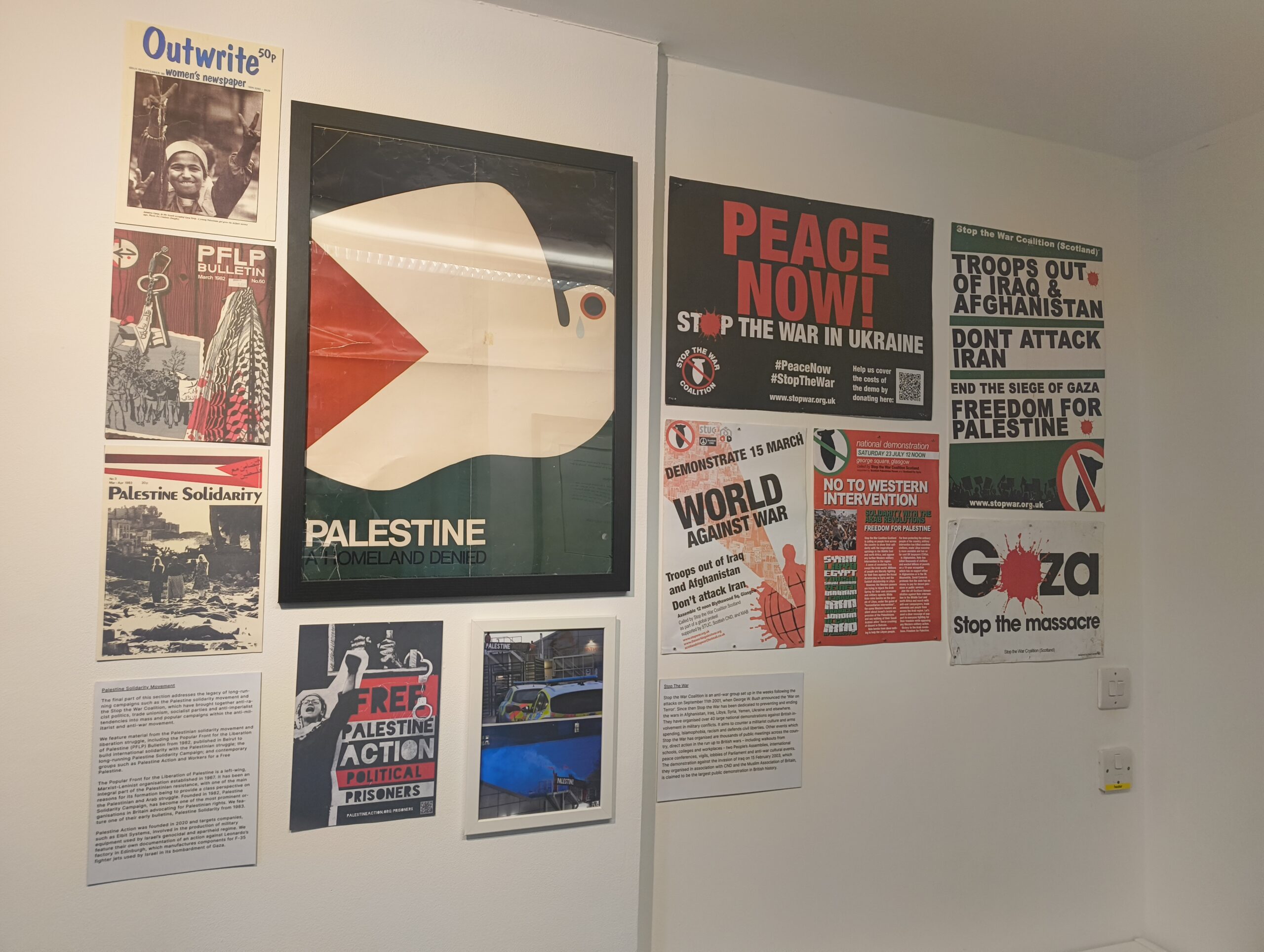The long history of challenges faced by women has been countered by the activism of women, as we organise to change the inequalities and injustices that we face within society. The campaigning that activist women of the past undertook can be contrasted with the campaigns of activist women in the present. These parallels highlight how the empowerment of women is something that we still need to work towards in ensuring that the barriers that we face within society will be removed, and that gender equality will be achieved.
In attempting to navigate the vast amount of material held within the archive of the library, looking the areas within which women have campaigned within society gave a starting point from which to research this. This does not reflect all of the areas within which women have campaigned, either in the collection of the library, or within the wider world. However, it does allow to think about how women are campaigning in these same areas today, whether this be individually, within longstanding movements, or new and emerging organisations.
Women’s suffrage
In Britain, the Women’s Social and Political Union, referred to by The Daily Mail as “Suffragettes”, was an organisation formed by Emmeline Pankhurst in 1905. Both suffragette and anti-suffrage postcards are held in the collection of the library. One shows a group of ‘Votes for Women’ campaigners stood in front of the Houses of Parliament, with the text “This is “the house” that man built, and these are the suffragettes of note determined to fight for their right to vote; for the mean to be, each one and M.P. and they’ll keep their vow some fine day you’ll see, for the suffragette is determined to get into “the house” that man built.
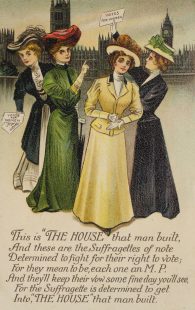
Another object in the collection is a photograph of Alison Thewliss, MP for Glasgow Central. The photograph was taken in 2018 for the national artist-led project 209 Women, with new photographic portraits of the 209 female MPs shot by female photographers. Although this project demonstrates how those women determined to get into “the house” that man built achieved this, it also highlights the shortcomings in the representation of women in parliament, with only 209 female members of a 650 member House of Commons. In addition to this, the project raises questions about the value of female labour, as the collective of 209 female photographers all volunteered their time for the project.
Women’s labour
In 1906 Mary Macarthur established the National Federation of Women Workers to organise women against the sweated industries and in their fight for the working wage. They first published The Woman Worker in 1906 to further the work of the federation. This issue, from August 1908, features an article recalling a pay dispute amongst ‘girl box-makers’ in The Summerstown Strike. During the strike, 44 female box makers from the Corruganza Box Making works in Summerstown, Wandsworth, South London, went out on strike as their manager called for a reduction in the rates paid for piece work. After 4 weeks, the local National Federation of Women Workers organiser, Sophy Sanger, negotiated a satisfactory settlement in September 1908.
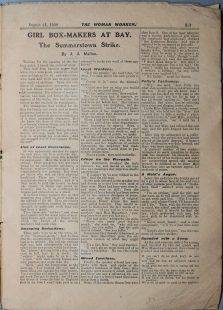
Women are still campaigning for equal pay, as the Glasgow Equal Pay campaign in 2018 demonstrated, with thousands of women across Glasgow demanded that Glasgow City Council resolve their pay dispute, as women were being paid up to £3 an hour less than male colleagues on the same pay grade. Council staff went out on strike on 23rd and 24th October 2018, in a successful campaign to settle the dispute. This placard is one of a number of campaign materials from the strike that are held in the collection of Glasgow Women’s Library. In June 2019, the women received their first payments, receiving an average of £35,000 each, in a total pay-out of £548 million.
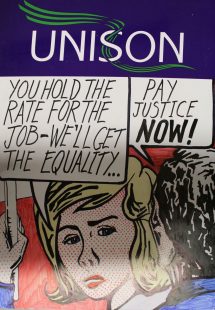
Reproductive Rights
The Scottish Abortion Campaign was formed in 1980 to defend The Abortion Act 1967. Their formation came in reaction to two anti-abortion campaigns lead by Scottish MPs, James White in 1975 and John Corrie in 1979. The Scottish campaign was affiliated to the National Abortion Campaign, which had been formed five years earlier. This t-shirt, from the collection of Glasgow Women’s Library, is from the National Abortion Campaign, and is held within the papers of the Scottish Abortion Campaign. This organisation merged with the Abortion Law Reform Association in 2003 to form Abortion Rights.
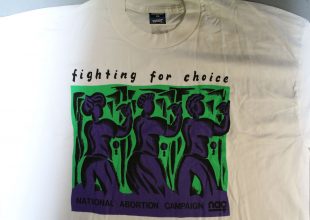
It was not until July 2019 that an amendment to the Northern Ireland Bill went through the UK Parliament, and is due to become law in October 2019. Until then, there are still women in Northern Ireland facing prosecution for choosing to have an abortion, something that women in the rest of the UK have the right to choose. This followed the abortion referendum in the Republic of Ireland in May 2019, which ended the 35 year struggle for safe, legal abortion. Abortion rights are at risk elsewhere globally, with restrictions being imposed by conservative governments.
Violence Against Women
Progressive and instrumental feminist groups have operated in Scotland since the 1970, and they have campaigned for an end to violence against women. Founded in 1976, Scottish Women’s Aid was established to provide support and temporary housing for women and children experiencing domestic violence. Also held by the library is the archive of the Zero Tolerance campaign, which began in 1992 with a radical Edinburgh-based poster campaign to bring the issue of violence against women into public consciousness.
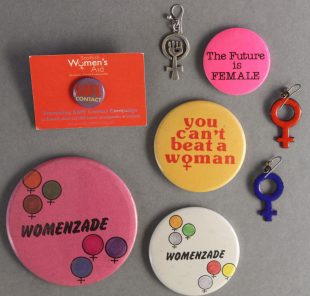
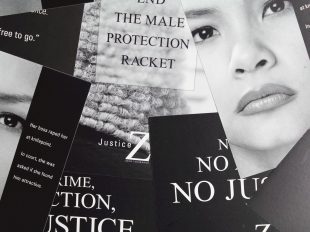
Both Scottish Women’s Aid and Zero Tolerance are still operating today, continuing to campaign for an end to violence against women. Scottish Women’s Aid campaign to give a voice to survivors of domestic abuse and to influence real policy change, influenced by what survivors and services want to see change. Zero Tolerance continue to campaign to raise awareness and prevent all forms of violence against all women.
LGBT Rights
Margaret Thatcher’s Conservative government introduced the Local Government Act 1988, which included Section 28. This was a clause that prohibited local authorities and schools from “promoting” homosexuality. Campaigners fought against the legislation, with actions that attracted attention to and support for its repeal, including a group of lesbians abseiling into the House of Lords in protest on the day that the clause was passed. The clause was finally repealed in Scotland in June 2000, and for the rest of the UK in November 2003.
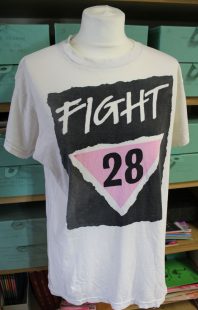
The campaign against Section 28 led to the creation of the LGBT lobbying group Stonewall. One of the campaigns that Stonewall works for today is the reform of the Gender Recognition Act, calling for the UK and Scottish governments to reform the current process, making a strong case to reform this, as it is outdated, dehumanising and excluding many trans people. Stonewall call for better recognition for trans people, including the increasing understanding of trans people within communities, by informing, inspiring and raising visibility.
Anti-Nuclear Campaigns
From the 1950s onwards, women’s peace campaigns began to focus their attention to the testing of nuclear weapons, which began the anti-nuclear movement. Since then, opposition has included the use of nuclear power. From the late 1970s onwards, Kathleen Miller became active in challenging the nuclear industry’s plans to investigate a potential site for the disposal of radioactive waste. The Kathleen Miller archive was donated to Glasgow Women’s Library in 2016. This photograph shows Kathleen, and other women, campaigning outside of Bute House, Edinburgh, in 1996 during the Dounreay Inquiry into the application for planning permission for the construction of the European Demonstration Fast Reactor Fuel Reprocessing Plant.
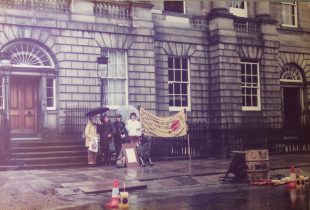
In 2018, United Nations High Representative for Disarmament Affairs Izumi Nakamitsu explained why the fight against nuclear weapons needs women more than ever, as powerful agents for peace.
The campaigns from the archive collections of Glasgow Women’s Library have the power to inform and inspire, as there are contemporary parallels which see campaigners still fighting for change in these same issues today. The upcoming Autumn programme at Glasgow Women’s Library explores women’s activism in ecofeminism, including the Re-reading Greenham Common event on Tuesdays 26th November and 3rd December 2019.

